Friday football injury clinic a game-changer
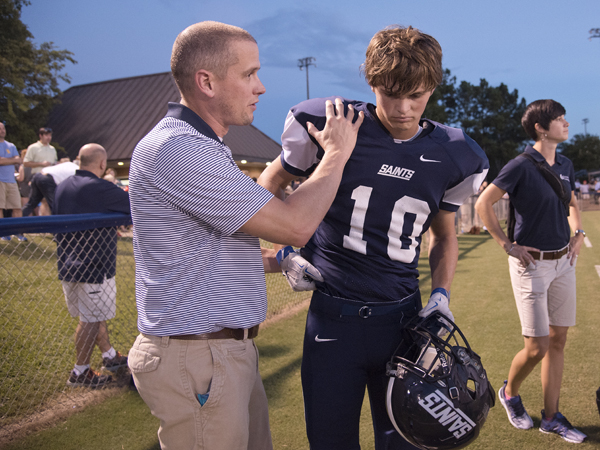
Published in News Stories on September 12, 2016
On any given Friday night during the high school football season, Braxton James can be found dashing from one fallen Lanier High player to another.
“The first game this season, I was back and forth between about 10 kids who were cramping,” said James, a University of Mississippi Medical Center certified athletic trainer. “I'll stretch them and massage their cramps. I'll give them a bottle of water with a small salt packet.
“I preach hydration and diet. I tell them to lay off the fried food.”
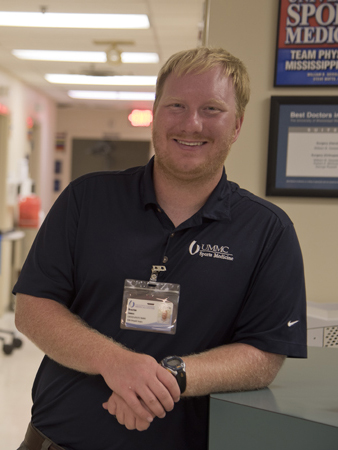
James
At Lanier's Sept. 9 game against Jim Hill High, a dislocated finger was the worst player injury; James popped it back into place. Luckily, he didn't have to advise any players or parents to go to the Medical Center's post-game high school sports clinic, which begins at about 9 p.m. each Friday of the regular football season.
It's a resource for all metro-area parents who want their athlete examined for game injuries immediately rather than waiting until Monday, said Dr. Brian Tollefson, associate professor of emergency medicine who regularly sees patients in UMMC's Emergency Department.
Tollefson is on a team of sports medicine experts staffing the clinic that includes Dr. Gene Barrett, associate professor of orthopaedic surgery; Dr. William Geissler, professor of orthopaedic surgery; Dr. Christopher Boston, associate professor of family medicine; and Dr. James Hurt, assistant professor of orthopaedic surgery.
The goal is for athletes whose injuries aren't extreme to be treated at the clinic instead of in an emergency room, where wait times vary depending on how busy staff is in treating those with life-threatening diseases or injuries. “It's an option for care right then, and it's cheaper and quicker than going to an urgent care center or an emergency room,” Boston said.
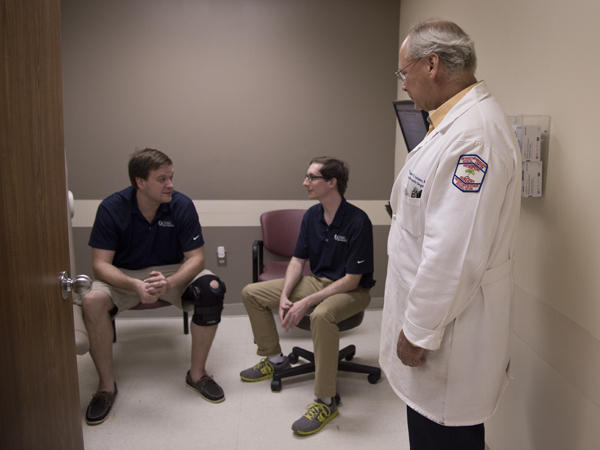
Orthopaedic surgeon Dr. William Geissler, right, waits for patients in the Friday night football clinic with second-year orthopedic residents Dr. Miles Hulick, left, and Dr. Paul Williams.
Patients are asked to arrive at the University Physicians Pavilion off the Woodrow Wilson Frontage Road, between the UMMC campus and the Veterans Affairs Medical Center. A receptionist at the front desk will direct patients to the pavilion's Suite D. They also can call (601) 984-6530 ahead of their arrival.
“We have full physical therapy services, bracing, casting and other services available right here,” Geissler said. “You can get an athlete fitted for crutches and show them how to use them. That's a service not available in an emergency room.”
Physicians' services and consultation are free at the clinic, which remains open until 11 p.m., or until the last patient is seen. Patients are charged for additional services.
Data from the Consumer Products Safety Commission shows that in 2015, a total 171,232 football-related injuries suffered by teens ages 14-18 were treated in emergency rooms nationwide.
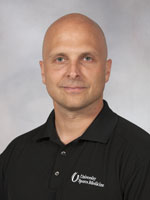
Tollefson
“We will see any injuries that happen in the games, and it's open to all athletes from all schools,” Tollefson said. The physician team has treated athletes for a number of conditions ranging from bumps and bruises to broken bones, and ligament and tendon tears.
The Medical Center also has full sports medicine services at the ready for examination and treatment of athletes with suspected concussions who come to the Friday clinic. Those resources include Boston, who is board-certified in sports medicine, completed a sports medicine fellowship at the University of Kentucky and was a team physician for the university; and Tollefson, who is board-certified in sports medicine and completed his fellowship at UMMC. If a student is diagnosed with a concussion, he and his parents are given information on care at home and advised to go to an emergency room if symptoms worsen.
UMMC has community outreach agreements placing physicians and trainers on the field and at practices for Lanier, Provine, St. Andrew's, Tri-County Academy and East Rankin Academy. They can handle routine injuries - bumps and bruises, dislocated shoulders or fingers, routine heat illnesses - on the field.
But more serious injuries, such as ACL tears, fractures and knee and head injuries, need quick attention.
And if an injury is truly significant, “they will go to the ED,” Tollefson said. “If it's an injury that needs to be reduced under sedation, they'll also go to the ED.” And, some athletes who arrive at the ED with minor injuries will be re-routed to the clinic.
UMMC trainers or physicians assigned to games call ahead to the clinic if a parent and child are headed there, Geissler said. During the season, the UMMC team develops friendships with players and their parents, and “if a child goes down in a game, the parent will seek you out very quickly,” he said.
“During the games, my focus is to watch the players on the field and on the sideline. I'll give my number to parents of kids who are injured during a game and tell them to call me over the weekend if they need me,” James said.
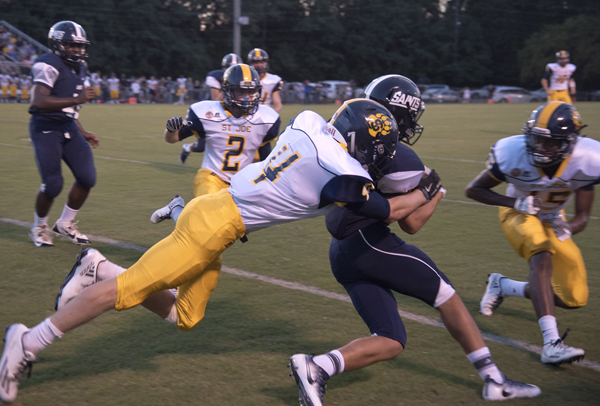
Injuries can happen on every play in a high school football game, with the severity sometimes unknown until later in the evening.
Even if doctors on duty at the clinic find an athlete isn't injured, “for the parents, that can be peace of mind,” Tollefson said. “On suspected concussions, we can determine if they need further imaging. Most do not, and we can take care of them in a clinic setting.”
“The biggest thing we worry about is spine injuries,” Geissler said. “At the beginning of the school year, we have training for all of our trainers. We've all had to stop a game and put a player on a (back) board.
“And, we're concerned about ACL tears,” he said. Patients seen at the clinic for that injury receive counseling on starting physical therapy and when they can play again.
Injuries aren't limited to orthopaedic woes, but include illnesses or injuries - for example, wounds needing stitches or dehydration issues -- best handled by a family medicine practitioner.
The goal for each football Friday is to care for every high school football player who walks in the clinic doors, no matter the injury or illness.
“We don't want parents to have to worry about it all night,” Geissler said.
Photos
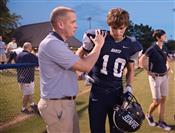 | Drs. Gandhi, Alston, Taylor-Resident retreat 2016.jpg High Resolution Medium Resolution Low Resolution |
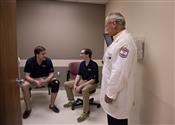 | Drs. Simon, Gandhi, Taylor, Alexander-Booth, Arthur-Resident retreat 2016.jpg High Resolution Medium Resolution Low Resolution |
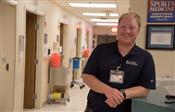 | Resident orientation retreat July 2016.jpg High Resolution Medium Resolution Low Resolution |
 | resident orientation retreat July 2016c.jpg High Resolution Medium Resolution Low Resolution |


